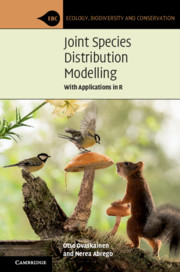Book contents
- Joint Species Distribution Modelling
- Ecology, Biodiversity and Conservation
- Joint Species Distribution Modelling
- Copyright page
- Contents
- Preface
- Acknowledgements
- Part I Introduction to Community Ecology
- 1 Historical Development of Community Ecology
- 2 Typical Data Collected by Community Ecologists
- 3 Typical Statistical Methods Applied by Community Ecologists
- 4 An Overview of the Structure and Use of HMSC
- Part II Building a Joint Species Distribution Model Step by Step
- Part III Applications and Perspectives
- Epilogue
- References
- Index
1 - Historical Development of Community Ecology
from Part I - Introduction to Community Ecology
Published online by Cambridge University Press: 18 May 2020
- Joint Species Distribution Modelling
- Ecology, Biodiversity and Conservation
- Joint Species Distribution Modelling
- Copyright page
- Contents
- Preface
- Acknowledgements
- Part I Introduction to Community Ecology
- 1 Historical Development of Community Ecology
- 2 Typical Data Collected by Community Ecologists
- 3 Typical Statistical Methods Applied by Community Ecologists
- 4 An Overview of the Structure and Use of HMSC
- Part II Building a Joint Species Distribution Model Step by Step
- Part III Applications and Perspectives
- Epilogue
- References
- Index
Summary
This chapter gives a brief overview of the history of community ecology, starting from the early 20th century debates on how communities should be defined and continuing until the modern conceptual frameworks. The chapter covers the criticism of community ecology, the views and theories that mainstreamed its avenue and the current unifying theoretical frameworks. The chapter discusses how the scale dependency of community processes is one of the main sources of criticism and disagreement among community ecologists. We introduce the early contrasting views and theories, such as the organismic versus individualistic continuum concepts of communities and the niche versus neutral theories. We further discuss the current unifying theoretical frameworks, such as the metacommunity framework, the assembly rules framework and Vellend’s Theory of Ecological Communities. Most importantly, the chapter introduces the concepts and ideas that underlie the ecological assumptions behind species distribution models in general, and Hierarchical Modelling of Species Communities (HMSC) in particular.
Keywords
Information
- Type
- Chapter
- Information
- Joint Species Distribution ModellingWith Applications in R, pp. 3 - 18Publisher: Cambridge University PressPrint publication year: 2020
